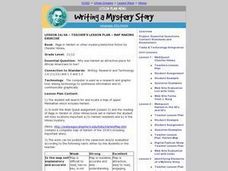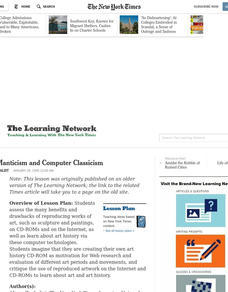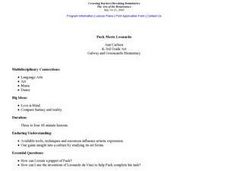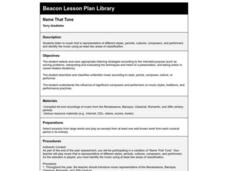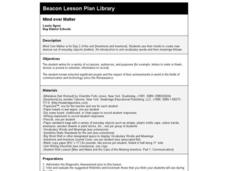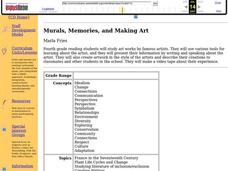Curated OER
Map Making Exercise
Students complete a Web Quest in order to determine why Harlem was an attractive place for African Americans to live. They study a map of Harlem in the 1930's.
Curated OER
CD-ROManticism and Computer Classicism
Students assess the many benefits and drawbacks of reproducing works of art, such as sculpture and paintings, on CD-ROMs and on the Internet, as well as explore art history via these computer technologies.
Curated OER
Isn't It Romantic?
Sixth graders investigate the ideas, literature, music, and art of the Romantic Movement. They apply romantic ideals to their original writing and art, analyze poetry, discuss key vocabulary, and analyze artwork from this era.
Curated OER
Japanese Objects as Cultural Artifacts: A Model Lesson Using Textiles
Learners complete a unit on the cultural significance of textiles in the Japanese culturre. They analyze cotton, line, silk, and wool fabrics, examine various fabric creation and decoration techniques, select an object and write a...
Curated OER
African Amercan Images in Harlem (1920-1950)
Eleventh graders compare and contrast different representations of African Americans in Harlem using visual sources. They detect point of views, themes, contradictions and ironies in sources using designed templates.
Curated OER
Of Maps and Worldviews
Young scholars explore Ptolemy's world map as an expression of the Renaissance view of the world.
Curated OER
Revolutions in Latin America: Bolivar, 1813-1814
Students compare the leadership skills of Washington and Bolivar. In this Latin American history lesson, students read biographical information about George Washington and Simon Bolivar. Students compare the men to better understand the...
Curated OER
Own Goals
Learners explore steps to control football violence. In this current events lesson, students listen to a lecture about patriotism, policing, and films relating to British football. Learners debate the efforts taken in Britain...
Roy Rosenzweig Center for History and New Media
War and Poetry
A band of brothers or the Devil's agents? Nobel warriors freeing the oppressed or mercenaries working for the military/industrial complex? Groups examine poems from the Civil War, World War I, and World War II to determine the poets'...
Curated OER
Puck Meets Leonardo
Students create a puppet of Puck from the story read aloud. Then they identify how they can use the inventions of Leonardo da Vinci to help Puck complete his task. Students also observe the inventions of Leonardo from books and online...
Curated OER
Creating Context: The Printing Press as Impetus
Tenth graders examine the invention of the Gutenberg printing press and its effect on society. In groups, they research how much the press enabled various revolutions around the globe. They also identify the causes and effects of each...
Curated OER
Analysis of Character in a Short Story
Ninth graders examine a character from the short story, John Steinbeck's, "Flight." students respond to questions about the story and illustrate the character's journey.
Curated OER
The Search for Identity: "Their Eyes Were Watching God"
Students read the novel "Their Eyes Were Watching God". While reading the novel, they identify and discuss the figurative language used and use a passage of interest to them and analyze it in a written paper. They also discuss events...
Curated OER
Langston Hughes
Young scholars identify similarities between Hughes' poetry and music (jazz and the blues).
Curated OER
Urban Concentration and Racial Violence
Students research one of the many urban race riots in U.S. history, from the New York City riots during the Civil War to the "Red Summer of 1919" or the hate-strikes of 1943. They present their findings in the form of a newspaper's front...
Curated OER
Ancient World
Sixth graders play a powerpoint jeopardy game. This can be used as a test or as a way to review information. This is a culminating test for our unit on Ancient Worlds. The jeopardy game is based on goals in math, language arts, and...
Curated OER
Name That Tune
Fourth graders listen to different types of music, then categorize them into two different areas of classification.
Curated OER
Shakespear Scavenger Hunt
Learners use the internet to study basic biographical facts about Shakespeare in the form of an internet scavenger hunt. This activity is a great introduction to a Shakespearean unit of study.
Curated OER
Class Distinctions in Art And Literature
Students evaluate the validity of a society where the individual's place is based on such arbitrary norms as gender, family connections, economic status, or military prowess in this look at Asian culture.
Curated OER
Exhibiting Your Knowledge
Young scholars are introduced to the various museum functions. In groups, they create a traveling exhibition based on Gutenberg's invention and the first printed book. They share their exhibition with the class and answer any questions...
Curated OER
Murals, Memories, and Making Art
Fourth grade reading students study art works by famous artists. They use various tools for learning about the artist, and they present their information by writing and speaking about the artist. They also create artwork in the style of...
Curated OER
The Invention of the Printing Press
Students are guided through a series of websites which teach about the history of printing, the invention of the printing press, the trials of Johann Gutenberg, and advancements in printing. This 20 question multiple choice quiz is...
Curated OER
Art, Art, Everywhere
Learners create a PowerPoint presentation documenting the art of a chosen artist. After a brief presentation by the instructor, students use the internet to research and document the works and life of their chosen artist. They...


